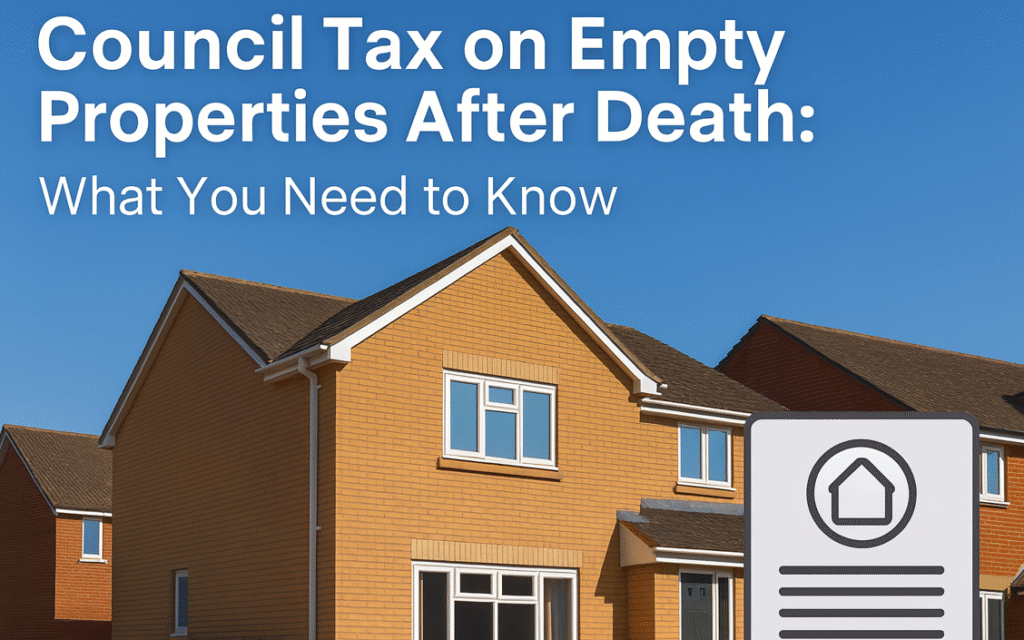When a property becomes empty due to the death of the owner or tenant, local councils in the UK apply specific council tax rules. Understanding these rules is crucial for executors, administrators, and family members dealing with the estate. Council tax can become a significant financial burden if not managed properly during the probate process.
Council tax liability does not immediately apply to an unoccupied property after death. Most properties qualify for a Class F exemption, but this relief is temporary. Knowing the timeline, responsibilities, and available exemptions will help you avoid unnecessary charges and legal complications.
In this guide, we’ll walk you through all aspects of how to avoid paying council tax on an empty property after death, including who is liable, how long the exemption lasts, how to apply for it, and additional ways to reduce or eliminate the tax.
What is the council tax exemption when a property is empty after death?

When someone dies, their property may qualify for a council tax exemption known as a Class F exemption. Beginning on the day of death, this exemption lasts until:
- Probate is granted (unlimited duration before this point), and
- As long as the property is uninhabited and in the deceased’s name, for a maximum of six months following the granting of probate.
If the property becomes occupied, sold, or ownership is transferred, the exemption ends immediately.
Who is liable for council tax after someone dies?
Ownership and occupation determine who is responsible for paying council tax:
- If the deceased was the sole owner and occupant, council tax stops until probate is granted.
- The executor or personal representative assumes responsibility upon probate.
- If someone inherits and moves in, they become liable from that point.
What steps must executors take to claim the exemption?
To avoid paying unnecessary council tax, executors must:
- Notify the local council immediately after the death.
- Submit a copy of the death certificate.
- Provide the probate document once available.
- Give contact details of the executor or administrator.
- Confirm the property is unoccupied and unfurnished.
Failure to notify can result in backdated charges.
What happens once probate is granted?

Once probate is granted:
- If the estate owns the property and it is vacant, the council tax exemption lasts for 6 months.
- After six months, full council tax applies unless the property is sold, transferred, or qualifies for other exemptions.
If delays in selling occur, executors can request discretionary relief or apply for an extension under Section 13A.
Which other exemptions or relief options might apply?
Other exemptions that may help reduce council tax liability include:
- Class A exemption: If major repairs or structural changes are needed.
- Annex exemption: If the property includes a self-contained unit.
- Charity exemption: If the property is donated to a registered charity.
- Military exemption: For homes owned by armed service personnel.
Ensure the property remains unfurnished to maintain exemption eligibility.
How do long-term empty home premiums affect liability?
Empty homes are subject to increasing premiums:
| Duration Empty | Council Tax Premium (England) |
|---|---|
| Over 1 year | +100% |
| Over 5 years | +200% |
| Over 10 years | +300% |
In Wales, premiums vary by local authority.
Avoid these premiums by:
- Selling the property quickly
- Renting the property temporarily
- Applying for a hardship reduction
What legal and practical actions help avoid or minimise council tax?
To reduce or eliminate council tax liability on a deceased’s property:
- Notify the council as soon as possible.
- Keep the property unfurnished.
- Sell or transfer the property promptly.
- Apply for Section 13A hardship relief if there are financial constraints.
- Explore use of property guardians to avoid premiums.
“Prompt communication with the council and thorough record-keeping can make a significant difference in securing exemptions” – Joanne Edwards, Chartered Tax Advisor.
How to avoid Council Tax debt after death?

To prevent council tax debt after a person’s death, it’s essential to act swiftly and manage the estate properly:
- Inform the local authority of the death immediately.
- Apply for a Class F exemption and submit all required documents.
- Ensure the property remains unoccupied and unfurnished.
- Avoid delays in selling or transferring the property.
- Monitor council letters or tax notices to catch any charges early.
- Consider seeking professional legal or financial advice.
What are common pitfalls and how can they be avoided?
Avoid these errors that lead to council tax charges:
- Assuming exemptions are automatic
- Failing to provide required documentation
- Ignoring deadlines after probate
- Leaving the property partially furnished
How long is property marketing accepted for exemption purposes?
Most councils accept proof of marketing for 6–12 months. Evidence such as agent listings, emails, and contracts strengthens exemption claims.
- Photographs of ‘For Sale’ signage placed at the property.
- Correspondence from estate agents showing listing dates and viewings arranged.
How to strengthen a hardship appeal: what councils expect
Provide evidence of financial strain, failed sale attempts, or probate delays. Include bank statements, solicitor letters, and unsold property valuations.
- Letters from potential buyers who withdrew offers due to market uncertainty.
- Written communication from estate agents confirming prolonged time on the market.
Real examples from executors: delays in probate and council responses
Some councils extend the six-month post-probate window in cases of genuine sale delays. Keep a timeline and all correspondence.
- Document communication with solicitors or conveyancers about probate delays.
- Record all attempts to market and sell the property, including viewings and offers.
Expert insight on paperwork: what evidence councils most commonly accept
- Estate agent listings
- Legal correspondence
- Utility bills confirming vacancy
- Property insurance stating unoccupied status
By acting swiftly, maintaining accurate records, and engaging your local council, you can legally avoid paying council tax on an empty property after death and prevent unnecessary financial burden on the estate
Summary Table: Council Tax Exemptions on Empty Property After Death
| Stage | Exemption Duration | Conditions |
| After death, before probate | Unlimited | Property unoccupied |
| After probate granted | 6 months | Property still unoccupied |
| Post-6 months | Full tax unless new relief | May apply for discretionary relief |
Conclusion
Avoiding council tax on an empty property after death requires clear communication, prompt action, and a good understanding of the available exemptions and legal responsibilities. By securing a Class F exemption, keeping the property unoccupied and unfurnished, applying for discretionary relief when necessary, and seeking expert guidance, you can ensure the estate avoids unnecessary debt and remains compliant with UK regulations.
Timely steps by executors can make a significant difference, both financially and legally. Staying proactive protects the interests of beneficiaries and honours the wishes of the deceased with minimal complications.
FAQ – Avoiding Council Tax on an Empty Property After Death
Do I pay council tax if the property is up for sale after death?
No, not during the six-month period after probate if it’s unoccupied and still in the deceased’s name.
What documents are needed to apply for council tax exemption?
Death certificate, probate grant, and executor’s contact information.
Can I avoid premiums by renting the property short term?
Yes, short-term rentals or property guardianship can prevent long-term empty status.
What if I can’t sell the property in six months?
Apply for Section 13A discretionary relief citing financial hardship or sale delays.
Does the exemption apply if the property is partially furnished?
No. The property must be completely unfurnished to qualify.

I’m Joe Chris, co-author at ukbusinessmag.co.uk and a long-time enthusiast of all things business and finance. My background is in digital marketing and e-commerce, and I love diving into trends that impact the UK business landscape. Through my writing, I aim to make useful, real-world advice accessible to business owners.



